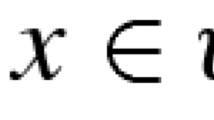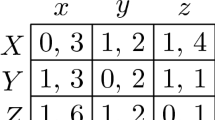Abstract
Iterated dominance is perhaps the most basic principle in game theory. The epistemic foundation of this principle is based on the assumption that all players are rational. The main contribution of this paper is to characterize the algorithm of iterated admissibility in Probabilistic Epistemic Game Logic (PEGL). Firstly, on the basis of Probabilistic Epistemic Logic we set up a logic PEGL. Secondly, by redefining a concept of rationality, we show that the common knowledge of the rationality characterizes the algorithm of Iterated Admissibility, that is, we provide an epistemic foundation for the solutions or equilibria which are found by the algorithm of Iterated Admissibility(IA). Next, we provide a different characterization of IA using public announcements of the rationality in dynamic logic. The results we obtain can be seen as giving a dynamic epistemic foundation for the algorithm of Iterated Admissibility.
Preview
Unable to display preview. Download preview PDF.
Similar content being viewed by others
References
Aumann, R.J.: Rationality and bounded rationality. Games and Economic Behavior 53, 293–391 (1999)
Brandenburger, A., Friedenberg, A., Keisler, H.J.: Admissibility in games. Econometrica 76(2), 307–352 (2008)
Gilli, M.: Iterated admissibility as solution concept in game theory. Technical report, University of Milano-Bicocca, Department of Economics (2002)
Rubinstein, A.: Modeling Bounded Rationality. MIT Press, Cambridge (1998)
Bernheim, D.: Rationalizable strategic behavior. Econometrica 52(4), 1007–1028 (1984)
David, P.: Rationalizable strategic behavior and the problem of perfection. Econometrica 52(4), 1029–1050 (1984)
van Benthem, J.: Rational dynamics and epistemic logic in games. International Game Theory Review 9(1), 13–45 (2007)
Bonanno, G.: A syntactic approach to rationality in games with ordinal payoffs, vol. 3. Amsterdam University Press, Amsterdam (2008)
de Bruin, B.: Explaining Games: On the Logic of Game Theoretic Explanations. PhD thesis, Institute for logic, Language and Computation, Universiteit van Amsterdam, Amsterdam, The Netherlands (2004)
Fagin, R., Halpern, J.Y.: Reasoning about knowledge and probability. Journal of the ACM 41, 340–367 (1994)
Cui, J.Y.: A method for solving nash equilibrium of game based on public announcement logic. Logics for Dynamics of Information and Preferences (2009), http://www.illc.uva.nl/lgc/seminar/?page_id=292
Brandenburger, A.: Forward induction. Technical report, Stern School of Business, University of New York (2007)
Kooi, B.P.: Knowledge, Chance and Change. PhD thesis, Institute for logic, Language and Computation, Universiteit van Amsterdam, Amsterdam, The Netherlands (2004)
Blackburn, P., van Benthem, J., Wolter, F.: Handbook of Modal Logic. Elsevier Science Inc., Amsterdam (2007)
Shimoji, M.: On forward induction in money-burning games. Economic Theory 19(3), 637–648 (2002)
Apt, K.R., Zvesper, J.A.: Common beliefs and public announcements in strategic games with arbitrary strategy sets. Journal of Logic and Computation (2007), http://www.citebase.org/abstract?id=oai:arXiv.org:0710.3536
Christian, E.: Iterated weak dominance in strictly competitive games of perfect information. Games and Economic Behavior (2002)
van Benthem, J.: Decisions, actions and game, a logical perspective. Technical report, ILLC, University of Amsterdam and Department of Philosophy, Stanford University (2008), http://staff.science.uva.nl/~johan/Chennai.ICLA3.pdf
Apt, K.R.: Relative strength of strategy elimination procedures. Economics Bulletin 3 (2007)
Ebbinghaus, H.D., Flum, J.: Finite Model Theory. Springer, Berlin (1995)
Stalnaker, R.: Extensive and strategic form: Games and models for games. Research in Economics 21, 2–14 (1997)
Author information
Authors and Affiliations
Editor information
Editors and Affiliations
Rights and permissions
Copyright information
© 2009 Springer-Verlag Berlin Heidelberg
About this paper
Cite this paper
Cui, J., Guo, M., Tang, X. (2009). Characterizations of Iterated Admissibility Based on PEGL. In: He, X., Horty, J., Pacuit, E. (eds) Logic, Rationality, and Interaction. LORI 2009. Lecture Notes in Computer Science(), vol 5834. Springer, Berlin, Heidelberg. https://doi.org/10.1007/978-3-642-04893-7_7
Download citation
DOI: https://doi.org/10.1007/978-3-642-04893-7_7
Publisher Name: Springer, Berlin, Heidelberg
Print ISBN: 978-3-642-04892-0
Online ISBN: 978-3-642-04893-7
eBook Packages: Computer ScienceComputer Science (R0)




